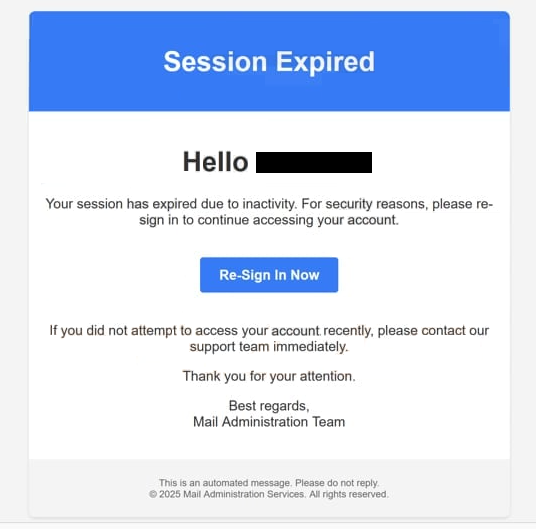Remove “Session Expired” email
The “Session Expired” email falls into the phishing email category. The email targets your email account login credentials. It warns that your session has expired recently due to inactivity, and for security reasons, you supposedly need to re-sign in to continue accessing your account. However, if you engage with the email and click on the provided button, you will be taken to a phishing site that asks you to log in to your email account. If you do as requested, your email login credentials will be stolen. This could lead to you losing access to your email account.
The “Session Expired” email is a non-sophisticated phishing attempt, generic in nature and easily recognizable as malicious. It claims your session has expired due to inactivity, and that you need to re-sign in to continue using the account. You are instructed to click on the provided button. The email is designed to mimic a security alert from the email service provider, but fails to do so convincingly.
Clicking the link provided redirects you to a phishing website that superficially resembles the official login page of the email provider. This fake page requests you to type in your login credentials, which are then stolen by the perpetrators of the phishing scam. The cybercriminals may use the stolen information themselves or sell it to others for malicious purposes.
Email login credentials are especially valuable due to the sensitive information often contained in email accounts. What’s more, email accounts are usually connected to multiple other accounts. Accessing an email account enables cybercriminals to exploit various linked services and even engage in potential blackmail.
The full text from the “Session Expired” phishing email is below:
Subject: System Notification:
Session Expired
Hello -,Your session has expired due to inactivity. For security reasons, please re-sign in to continue accessing your account.
Re-Sign In NowIf you did not attempt to access your account recently, please contact our support team immediately.
Thank you for your attention.
Best regards,
Mail Administration TeamThis is an automated message. Please do not reply.
© 2025 Mail Administration Services. All rights reserved.
Signs of a phishing email
Phishing campaigns are often easy to identify due to their generic nature, as is the case with this “Session Expired” email. These campaigns typically target many users with identical generic emails, making them relatively straightforward to recognize. However, phishing attempts directed at high-profile individuals or companies are usually more advanced and harder to detect. Fortunately, most people primarily encounter the more common and generic types of phishing emails.
When you receive unsolicited emails, verifying the sender’s email address should be your first step. In some cases, it is evident that the address is malicious, as is the case with this “Session Expired” email. However, malicious actors frequently employ techniques to make email addresses appear professional and legitimate. Thus, it is highly recommended to research these addresses before acting on any requests in the email. Often, a quick Google search is enough.
Additionally, be vigilant for grammar and spelling mistakes, as legitimate emails are generally well-written, whereas low-effort phishing attempts often contain numerous mistakes. Even when an email seems more polished, look for awkward phrasing or generic greetings like “Hello [email username],” which are common indicators of phishing. Trustworthy companies typically address recipients by name and ensure their correspondence is free of any mistakes.
Finally, avoid clicking on links in unsolicited emails. If you receive an email claiming there is an issue with your account, manually log in to the account to verify the problem instead of using the provided links. Moreover, always scan attachments from unsolicited emails with anti-malware software or use tools like VirusTotal to ensure they’re malware-free.
How to remove “Session Expired” phishing email
If you receive this “Session Expired” email, disregard its content and delete it immediately. If you have already engaged with the email, clicked on any links, and entered your login credentials, immediately change your password, provided you still have access to the account. In cases where the account is no longer accessible, attempt all available account recovery options. To minimize the risk of compromising other accounts, disconnect your email from any linked accounts if access to the email account is no longer possible.
Site Disclaimer
WiperSoft.com is not sponsored, affiliated, linked to or owned by malware developers or distributors that are referred to in this article. The article does NOT endorse or promote malicious programs. The intention behind it is to present useful information that will help users to detect and eliminate malware from their computer by using WiperSoft and/or the manual removal guide.
The article should only be used for educational purposes. If you follow the instructions provided in the article, you agree to be bound by this disclaimer. We do not guarantee that the article will aid you in completely removing the malware from your PC. Malicious programs are constantly developing, which is why it is not always easy or possible to clean the computer by using only the manual removal guide.

